THIS POST IS BY VIRGINIA. I AM POSTING IT HERE BECAUSE SHE DOES NOT HAVE HER OWN BLOG. PLEASE DO NOT COMMENT HERE, BUT EMAIL YOUR THOUGHTS TO HER AT vmhagler@aol.com
Thunder in the East is the 21st picture Alan Ladd made in which he is the star. It came almost exactly halfway through his starring filmography. It began filming in March of 1951 at Paramount studios and finished sometime in June because #22 began filming in July, on location in Wyoming.
Thunder in the East is also the third on my Alan Ladd favorites list, but this wasn’t true the first few times I saw it. That’s because the trailer and the phrases on the posters and the DVD cover, etc. are very misleading and it took me quite a few viewings before I tumbled to that and saw the picture as it actually unfolds. It seems bizarre that the film’s promoters didn’t even understand their own movie. Thus many reviewers, including many private people who commented on various online movie sites, totally misunderstood the main character, thinking he fell into the stereotype character they thought was typical of all Alan Ladd’s roles—the selfish care-for-nobody cad, somewhat like David Jones in China or Choya in Branded, who will be “redeemed” by an awakening of conscience.
The story takes place in 1947 in a fictitious country in the mountains in the north of what was formerly the British colony of India. The country (or maybe it’s only a province) in this movie is called Ghandahar, and so is its capital city. It is ruled by a maharajah and a prime minister, who is played by Charles Boyer, who did a superb job in this film. His is a very pivotal role.
Basically, there are two stories going on in the film. The first involves the attempt by a warlord and his followers who are trying to pull off a coup and overturn the government. Their leader is called Nawab Khan. Philip Bourneuf, the actor who portrays him, is excellent and classy.
Within that outer story is what I consider a beautiful love story. The two characters played by Alan Ladd and Deborah Kerr fall in love almost at first meeting. They both shine in enacting this as it is happening. You can see that he first finds her beautiful and feisty when he applauds her for “telling off those fuddy-duddies” as he calls it. Gradually he becomes fascinated by her as he realizes that she is blind, but that she courageously accepts this without any self-pity, and then he begins to admire her lack of helplessness and her clever ability to bargain in the shop, and finally he’s fallen in love and totally forgets the assignation he had made earlier with a different woman, brilliantly played by Corinne Calvet. Deborah Kerr is right-on in her performance as a sheltered 30-ish woman becoming a besotted girl who is totally swept off her feet by this guy. It’s a case of love-at-first-sight, only she can’t see his incredible good looks, so there is something else about him that captivates her. It could be his wonderful voice, but I think his warmth and admiration also make a good impression on her. They both have clever senses of humor and each appreciates the other’s wit. By the end of their evening together, they have transitioned from physical attraction to a real love based on respect and admiration. They both demonstrate their feelings when they are getting ready in their own rooms to go to sleep. It’s a clever bit of direction by Director, Charles Vidor, to have each lie back on their beds, dreamily aware of what has begun for them that evening.
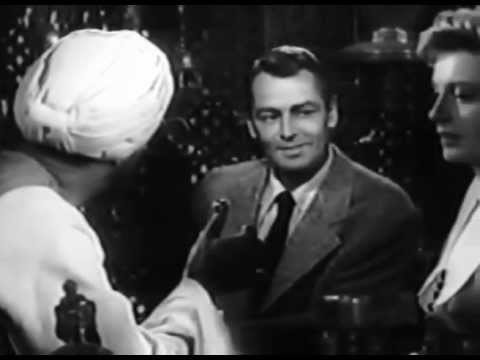
Of course for there to be a story, there must be difficulties in their relationship. Theirs are brought about chiefly because he’s an American-style businessman, and she’s an idealistic and very sheltered British woman who has no idea of the difficulties of earning a living or of the losses he has already been dealt on this business trip. A major misunderstanding begins when he quotes the fare for a seat on his airplane to fly out of the now dangerous situation in Ghandahar. The spoiled British former colonists object to the price and soon insult him for taking advantage of the situation. She takes the criticism of him by her fellow Brits to heart, and she hurls him off the pedestal where she herself had placed him. She’s really awful to him, probably because she is so disillusioned that he isn’t the demigod she had imagined him to be. He is visibly shocked by her attack on him when she tells her grandfather to preach a sermon for them because they’re all going to die due to the actions of one blackguard; and you can see he’s really hurt by it. But he continues to love her and she is the first thing he anxiously looks for whenever he returns to the palace where they are all holed up in the later part of the film, and he is always near her whenever he can be. I always tear up when she finally realizes how deeply he loves her and how heroic this makes him under the circumstances. It’s very romantic then.
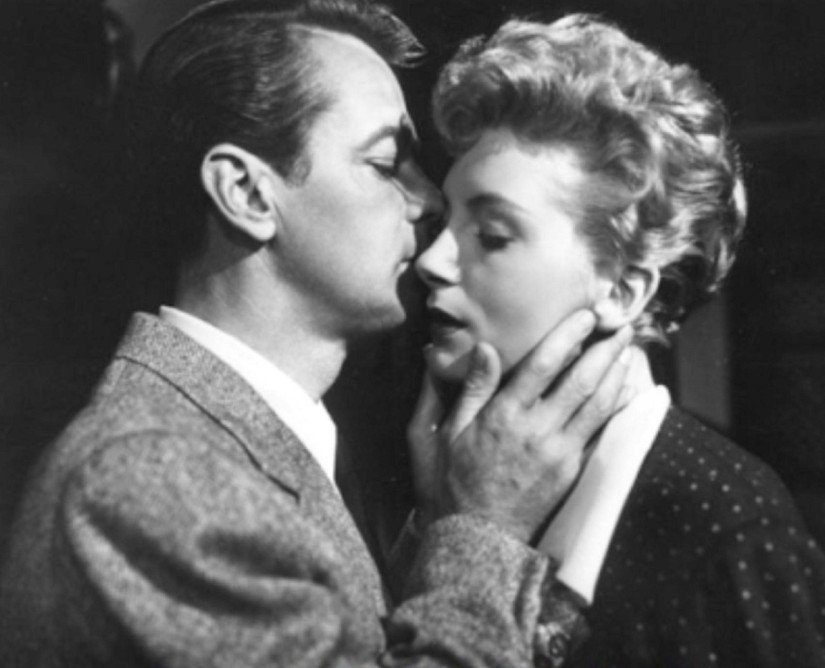
The outer story is also done well and the level of suspense tightens slowly as one by one the chances for escape are cut off. This part of the story begins with the arrival of an airplane into Ghandahar, piloted by Steve Gibbs, Alan Ladd’s character. He claims to have an appointment with the maharajah, which gets him in to see Ram Singh (Charles Boyer), the Prime Minister, who handles all the maharajah’s appointments, “both real and imaginary.” Gibbs tells the PM that he has just flown in “20 machine guns, 100 rifles, and 200,000 rounds of ammunition,” but, to his dismay, Ram Singh turns out to be a pacifist and admirer of Gandhi. “We are not interested in your guns,” he tells Gibbs, dismissing him. When Gibbs suggests that he’ll just have to sell them to someone else, Singh calls the air field and has all the guns and ammunition confiscated.
The next day, Gibbs has a real appointment to see the maharajah that was arranged by Joan, Deborah Kerr’s character. Here he is frustrated and angered to learn that the maharajah is a ruler in name only, that Ram Singh holds the real power and that he has impounded Gibbs’s cargo. He also learns that the busload of English men, women, and children that had left the hotel the day before, had been attacked on the road by the tribesmen of warlord Nawab Kahn and that “no one was spared.” He leaves in disgust and goes to Joan’s house to tell her the picnic she had planned cannot happen, but that he will take Joan and her grandfather with him when he leaves that night because it is not safe for them to remain any longer. She asks him if he could take some of the others and he arranges for her and her grandfather to contact those people and all meet him in the hotel while he gasses up his plane. This is where the scene occurs when the British insult him for wanting to charge them a round trip fare. It’s unclear whether he means to bring them back when the emergency is over, or if the fare includes the cost of him getting to Ghandahar in the first place to be in a position to get them out.
At this point it all goes wrong. The spoiled Brits start insulting him and calling him a scoundrel bent on taking advantage of the situation. Joan suggests that he is joking, and he explains that he never jokes about money, that he is a commercial pilot, and that flying is how he makes his living. The others continue to insult him, one even going so far as to say he’s as bad as Nawab Kahn, and anyone, except the people in that room, could see that he is really angered by this, and when General Sir Henry says that a “really enterprising swindler” could command $10,000 rupees, Gibbs is so furious that he confirms the General’s suggestion of that outrageous fare. For this, Joan slaps him hard and storms out leaving him rather stunned and ostracized by everyone else. The poor guy. Neither he nor they know anything about each other and they’ve just had this big verbal war where the Brits attack, attack, attack. The only thing he can do to vent his anger under that attack is to respond the way they have accused him of doing/being. (But notice who does the cooking of breakfast the next morning.)
It’s unfortunate that the publicists and thus the reviewers misinterpreted that scene and the background leading up to it because I don’t think the film was marketed to be as successful as it should have been. The movie ads and introductions, including the trailer, all summarize the story by saying “A gunrunner flies into Ghandahar with a plane load of weapons,” blah, blah, blah. Others say he’s a “selfish gunrunner” who cares only about saving his own neck, or words to that effect. NO! He’s not a gunrunner. He’s a part owner of a small commercial airline who, seeing that there is bound to be a market for guns in Ghandahar because of the uprising by the followers of Nawab Khan, gambles on the idea of buying up a lot of guns and taking them to Ghandahar to sell. He offers them first to the government but they are not interested. At that point he doesn’t know anyone on either side of the conflict, so it doesn’t matter to him who buys his guns. As a businessman, he just wants to make a nice profit on the guns he bought on speculation to take there and sell. Later, when he realizes that the situation is becoming very dangerous, he determines, quite naturally, since this isn’t his country or his quarrel, to leave ASAP.
As a half-owner of a business, he has the responsibility of getting that airplane and himself out of harm’s way. But I don’t think he is any more selfish than the average single person without family responsibilities, or that he is thinking only of himself. Early in their acquaintance, he told Joan that he had been a member of The Flying Tigers in China. They were a semi-private American military force of volunteers that fought for China before the US got into WWII. So we know that he is not the kind of man who would run away from dangerous situations solely to save himself. Joan should have known it, too. But maybe she was too sheltered from real life to realize it.
There’s a wonderful example of Deborah Kerr’s great acting when she comes hesitantly down the stairs in the palace, not yet familiar with the layout of the place. Gibbs, looking for Joan, sees her, and when the wall she’s using as a guide sets back and falls away from her hand, he reaches up and takes her hand. She can’t see who is guiding her down and she says a pleasant “Thank you.” She says that she is trying to find the trophy room and thinks it is just there to the left of the staircase. He looks in, opens the door and says, “This looks like it.” She recognizes his voice and says “Thank you” again, but you can practically see the icicles hanging off her words. She walks confidently in to the left with only a slight bump into a table and goes to sit at the piano and starts playing. He goes in and tries to get her to come with him in the jeep he has just bought from Singh. They quarrel again, and frustrated, he walks out.
Convinced that Gibbs only wants to save his own skin, Joan continues to think very poorly of him, even after he comes back to report that he met with Nawab Kahn who allowed him to make a phone call and arrange for a plane to come the next day to fly them all out. But Joan leaves while all the others are looking pleased. When he goes to her room to ask why she walked out on him she says that heroes always affect her that way and she hits him with some more hurtful remarks. It’s hard to know why she’s so convinced that he’s such a cad. Maybe she’s really determined to be hard-hearted to protect herself from “falling” for him again. Maybe she’s trying to protect herself from admitting she was wrong. She says she’s trying to forget for her own peace of mind. Like with real people, it’s hard to know why others do the things they do and say the things they say.
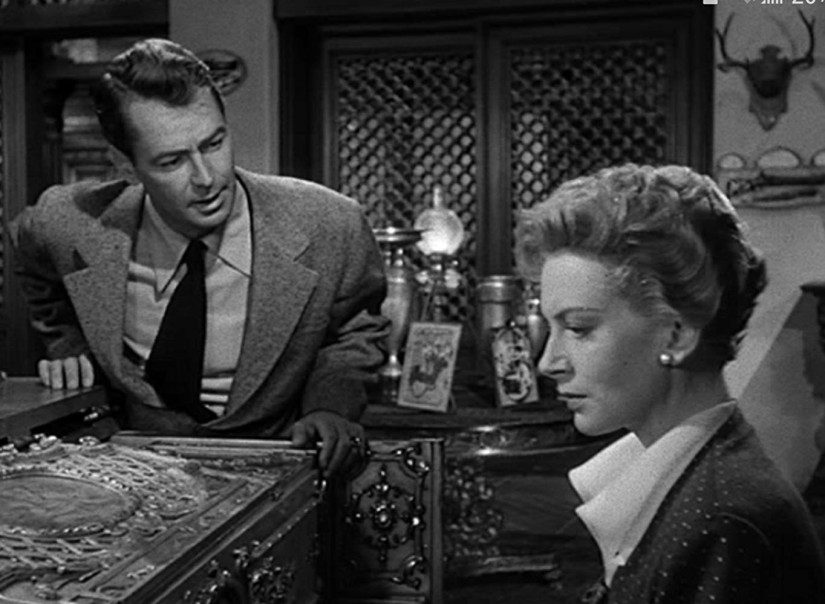
Alan Ladd’s acting in this movie is amazing and embraces a wide range. He’s friendly and charming and witty, the way salesmen usually are, because that’s what he is trying to do, sell his cargo. He flirts charmingly with the French girl. He quickly befriends the boy who has cast himself in the role of servant, and you can see that he becomes quite fond of the kid. Then he acts like a man who is intrigued, then fascinated and admiring, then head over heels in love. He naturally persists in trying to sell his cargo after the first rebuff, then becomes angry when frustrated again by the prime minister, and he displays this and his bitterness at the situation and the consequences to himself and the more drastic consequences to several innocent Brits that have already resulted out of the prime minister’s attitude. As he gets to know the other people caught in the palace, his anger subsides, and his leadership asserts itself, especially after the general is killed. I find his character admirable because he has such confidence in himself that he doesn’t let the continued insults bother him once he gets over his anger, and he reverts to his usual helpfulness and volunteering ways. He even goes on loving Joan in spite of her less than kind treatment of him. In short, Ladd’s acting in this picture is quite a tour de force and every bit as wonderful as it is in his most famous role, for which he was rightly praised, in the very next picture he made, which was Shane.
The ending is very abrupt and somewhat irrational. But when seen in a theater, it probably elicited cheers from the audience. Actually, this movie is one of the kinds that most appeals to persons like me, who love to “continue” the story in their own imaginations from the movie’s ending point.
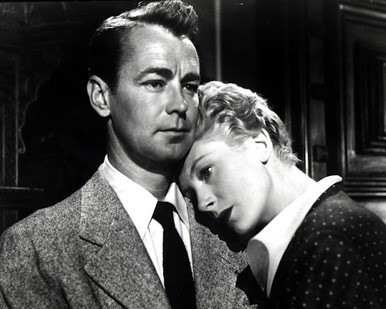
THIS POST IS BY VIRGINIA. I AM POSTING IT HERE BECAUSE SHE DOES NOT HAVE HER OWN BLOG. PLEASE DO NOT COMMENT HERE, BUT EMAIL YOUR THOUGHTS TO HER AT vmhagler@aol.com
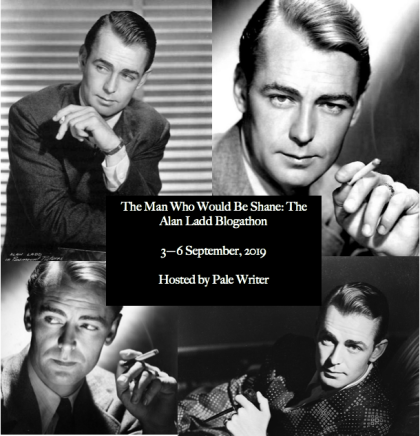

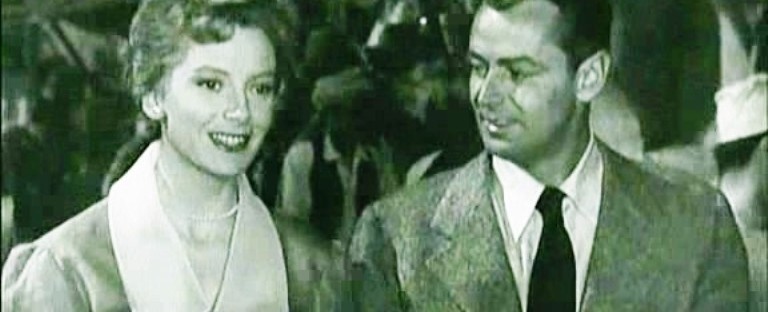
1 thought on “Thunder in the East (1951)”